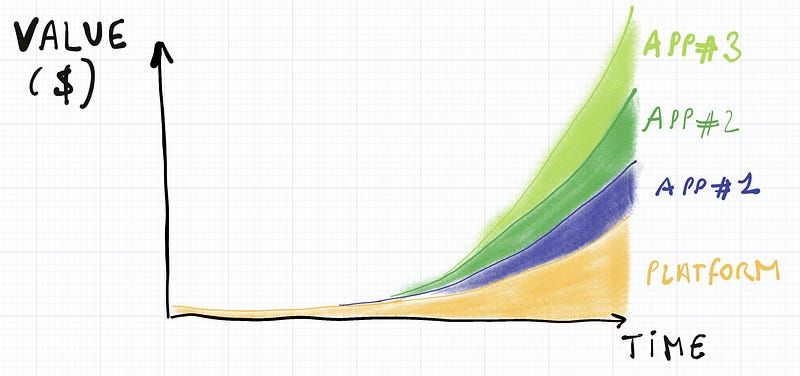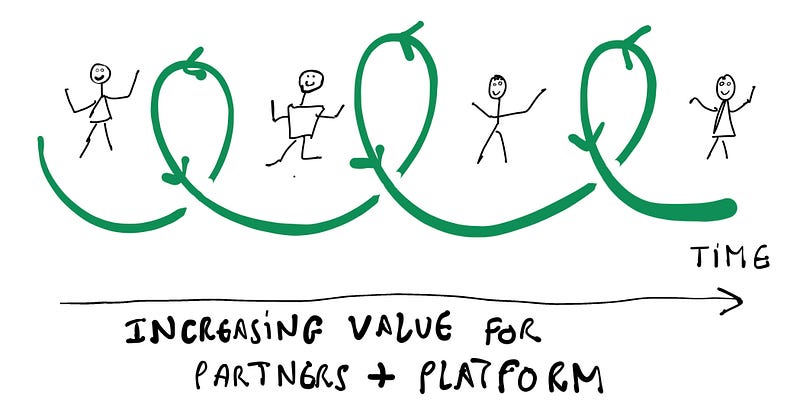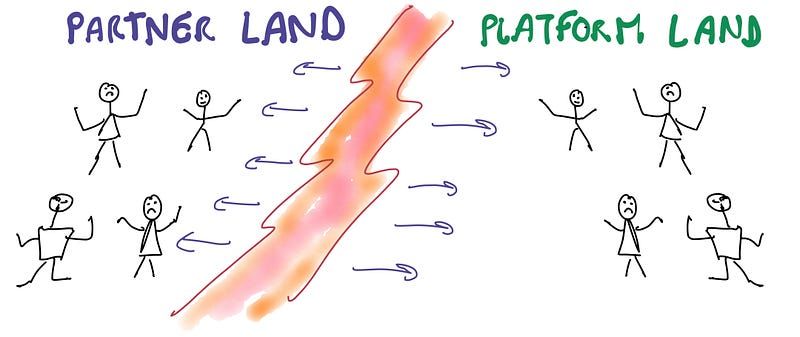From Product to Platform — Conclusion (5/5)
Summary of lessons learned in the land of platforms#
Complete series:#
This post is the fifth part in a series of five regarding platforms and the critical differences with products:
- Platform Product Manager: Partner (1/5)
- Platform Product Manager: Complexity (2/5)
- Platform Product Manager: Mental Models (3/5)
- Platform Product Manager: Revolution and Evolution (4/5)
In this post, I uses PM as an acronym for a regular PM role and PPM for a “platform product manager” role.
Critical differences between product and platform#
The platform & partners form an ecosystem centered around value creation for the platform users. By definition, on aggregate, the platform derives less value than the partners.

App and platform functionalities create incremental value and this effect compound with time.
This derived value is connected to the partners’ knowledge: on aggregate, partners have a superset of the platform knowledge.
Partners are diverse. Each of them provides distinct value to the ecosystem: training, support, consulting, developer. The partners most impacted by the platform changes are the ones relying on the API and extending the platform capabilities.
Partners form a community that requires caring and frequent interactions with the platform teams. The platform teams and partners co-create to increase the global value derived by the partners and the platform.
For developers, the main interactions between partners and the platform happen via an API that has to be managed by the platform, including legal, financial, GDPR and other regulations.

Most of the time, the value distribution between the partner and the platform community changes gently with time. Each new API release allows partners to unlock incremental value for their users.
However, sometimes, a tectonic shift occurs. These shifts happen when some functionality previously offered exclusively by partners is integrated into the platform.

These tectonic shifts are rare and caused by wrong strategic decisions by the platform over a few years or by a critical business or financial change. Because these shifts cause a loss of trust in the partner ecosystem, platforms tend to avoid them as much as possible.
A platform will always prioritize its user needs before the partner needs it. The overarching goal is value creation and to continue to play the infinite platform game.
Product Managers listen to the voice of the customer.Platform Managers listen to the voice of the developer as well.
Platforms have to focus on the bigger picture and strategic growth. It is the main flywheel responsible for platform success. The Pareto principle can guide the platform to decide which feature is core and which one should be part of the partner value creation chain.
For any decision, always use multiple mental models and make sure to consider usability, feasibility, and viability.
Conclusion#
At a human experience level, I don’t believe that being a PM or PPM makes any difference. One is not intrinsically more fulfilling than the other. They both have their own set of challenges.
You can not win the human existence by defining a metric or by having or not a job title. If you believe this, please review the finite vs infinite game mental models ;-)
In one of the mental models used to describe platform and products, we used the single organism vs ecosystem analogy. In this analogy, a PM is more like a veterinarian or physician taking care of a single individual.
If we continue this analogy, a PPM is like a gardener providing heat, humidify, nutrient to a complex partner ecosystem of plants and animals. Most of the time, the ecosystem evolve slowly with each season; the gardener better understands the ecosystem and make a better decision regarding the various plants and animals living in the ecosystem. Once in a while, natural disaster strikes. These tectonic shifts are destroying part of the ecosystem or creating a fault line between some constituents of the ecosystem.
While PMs have a direct and immediate influence on their product, PPM exercise an indirect impact. PPM receive delayed feedback on the changes they operate, and they tend to operate via small, incremental changes to maintain trust within their partner ecosystem.
From a personal growth angle, I believe that the PPM role will help you grow faster. The leading cause is the intrinsic complexity of the platform. As a PPM, you will have to interact with more stakeholders both inside your organization (other teams, app store, API team, finance, etc.) and outside of the organization (partners). These interactions will give you even more opportunities to develop meaningful, real and robust human to human interactions with lots of super-smart, tech, and business savvy entrepreneurs. It will also encourage the development of system-based thinking: each of your decision will impact systems loosely connected to your platform area.
Interacting with these fellow entrepreneurs can be super fulfilling, and it will provide lots of insight about your customers if you can tap into this superset of knowledge. Partners are outside of your organization. You can also expect real-life and non-biased feedback on your organization practices, values, product and, of course, API and business model.
This feedback will correlate, or not, with the kool-aid that one tends to drink when having feedback loops provided exclusively by co-workers and management.
As a PPM, you will be in a unique position to bridge the gap between these two versions of reality and improve the ecosystem.
Complete series:#
- Platform Product Manager: Partner (1/5)
- Platform Product Manager: Complexity (2/5)
- Platform Product Manager: Mental Models (3/5)
- Platform Product Manager: Revolution and Evolution (4/5)
- Platform Product Manager: Conclusion (5/5)
Feedback is a gift 🙏: Please do not hesitate to share your thoughtsts
- via the contact page form
- via a LinkedIn connexion or message